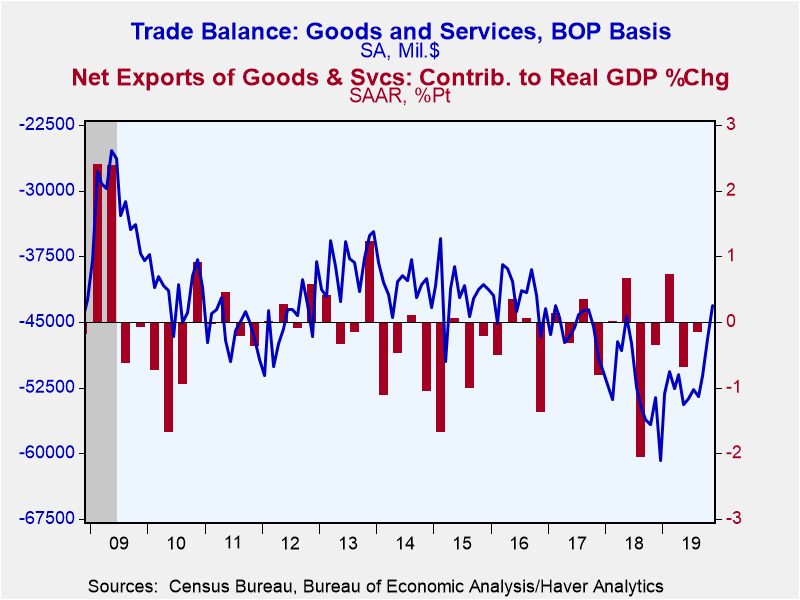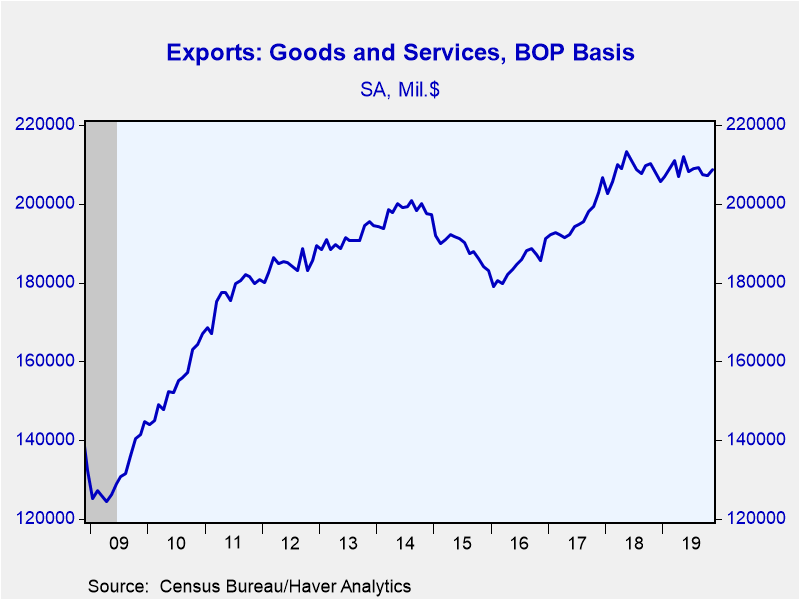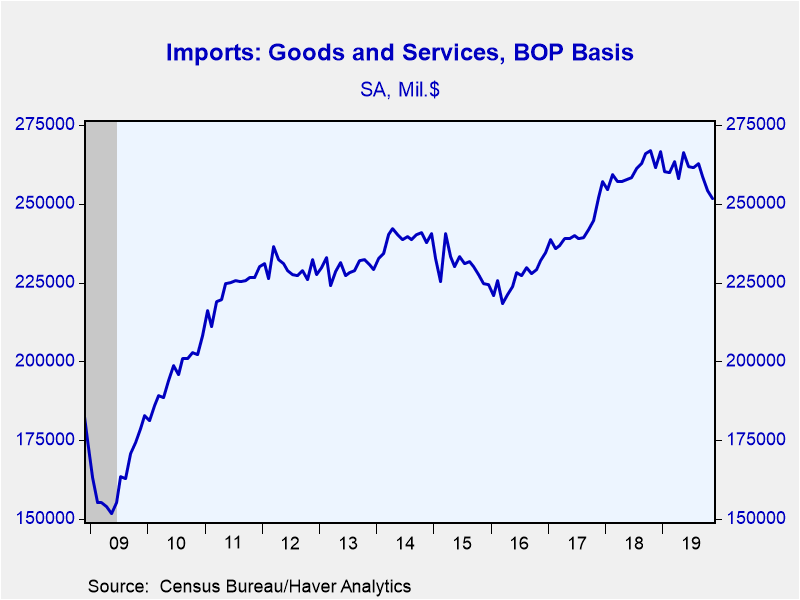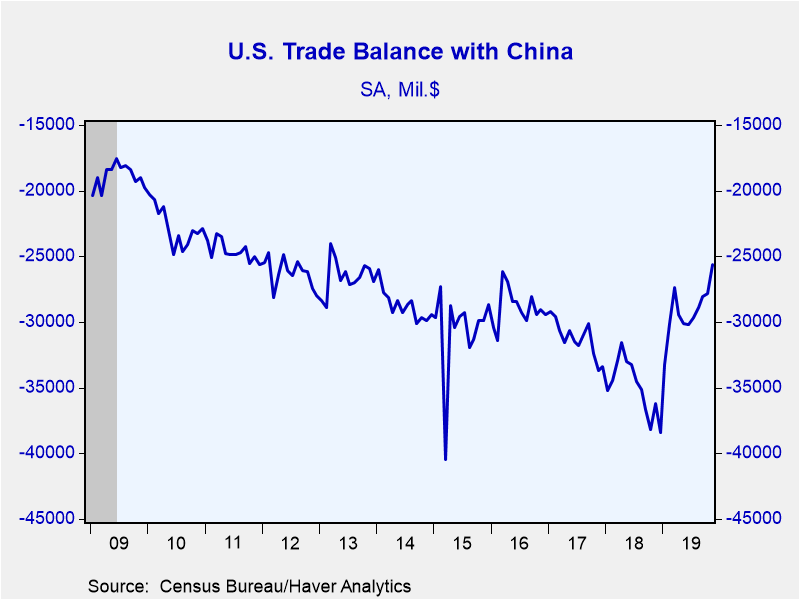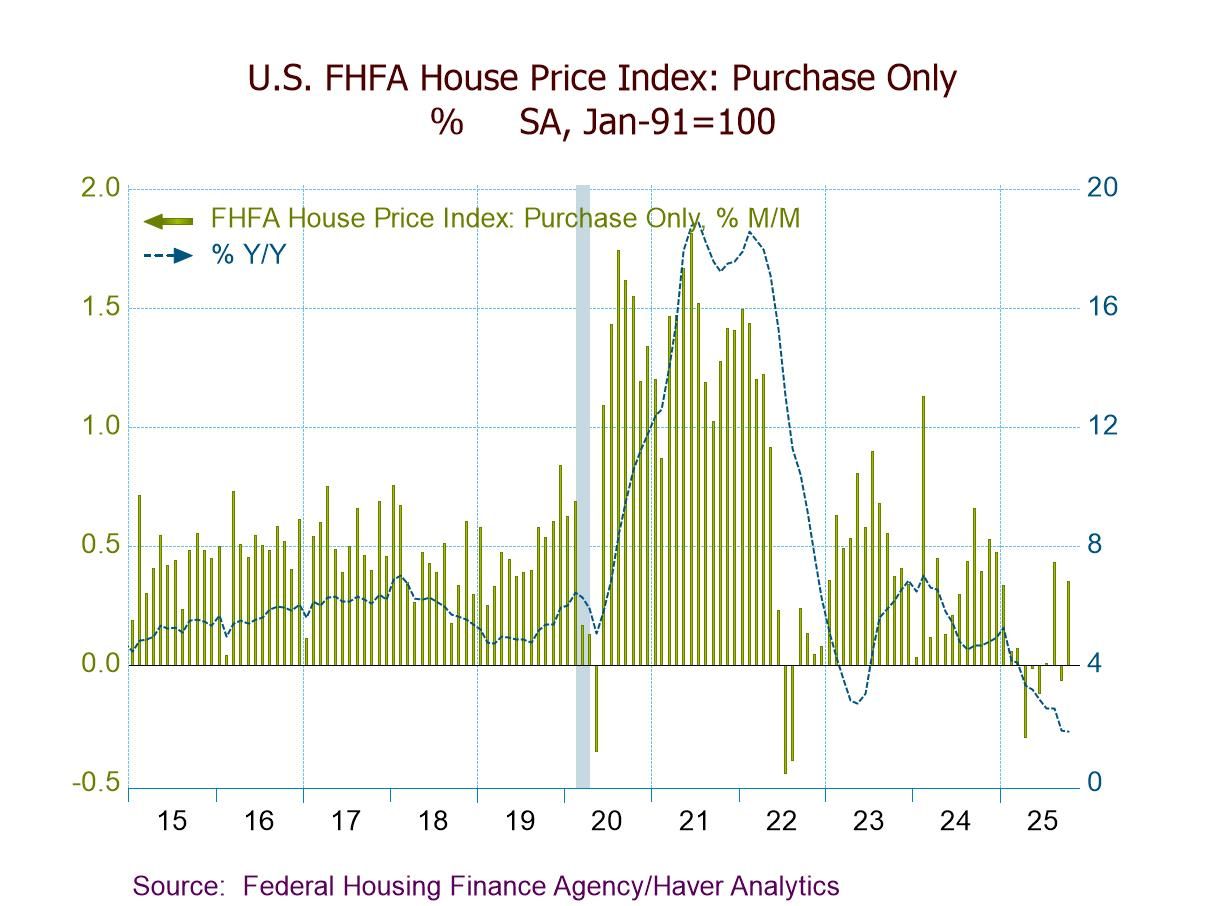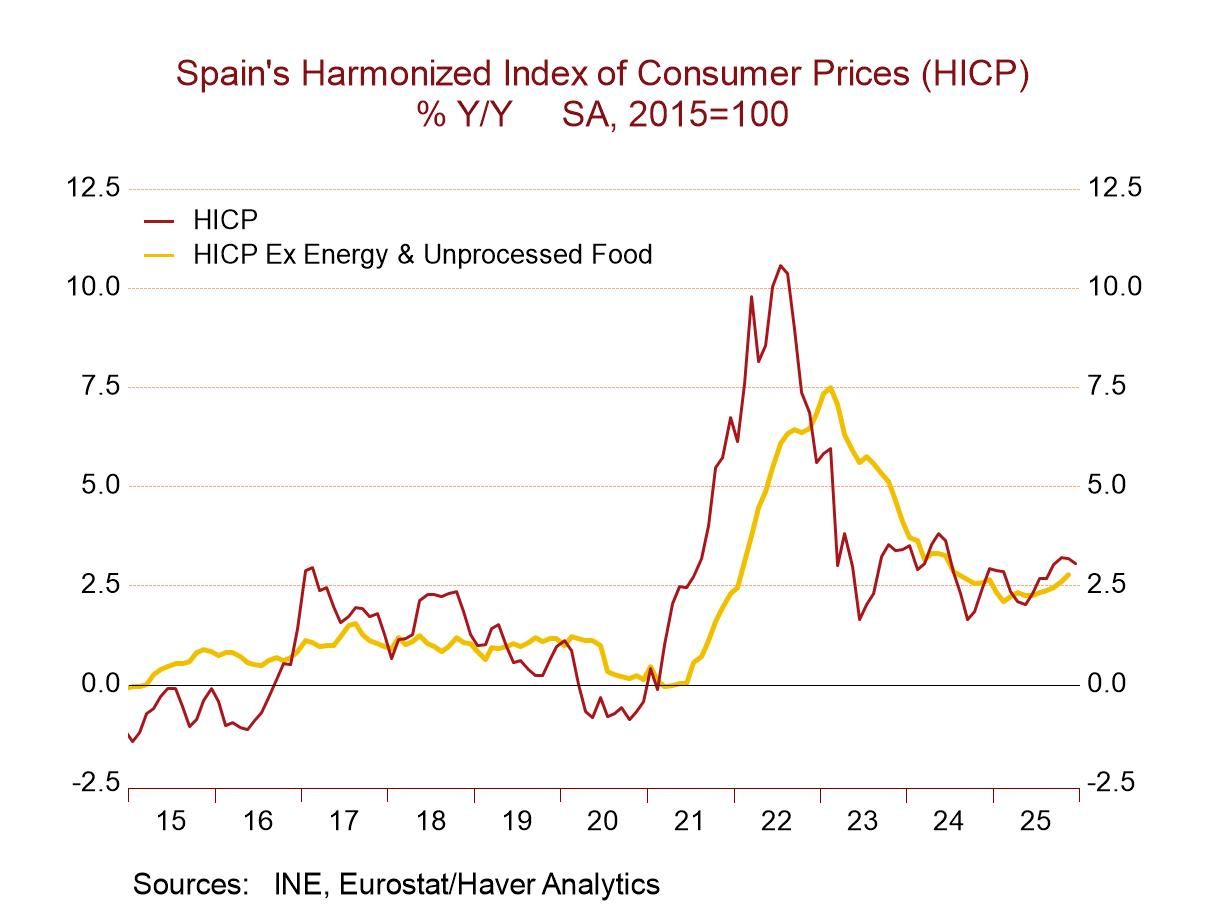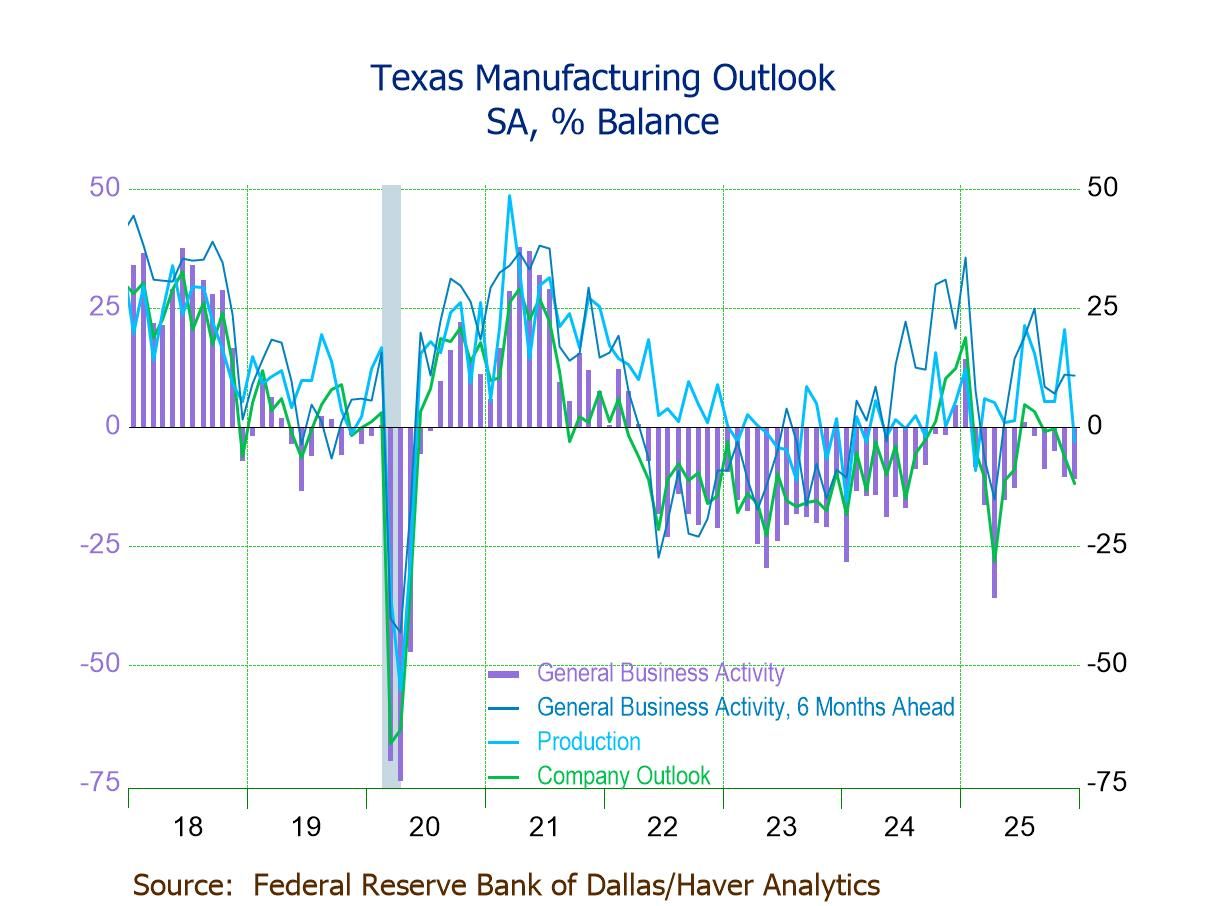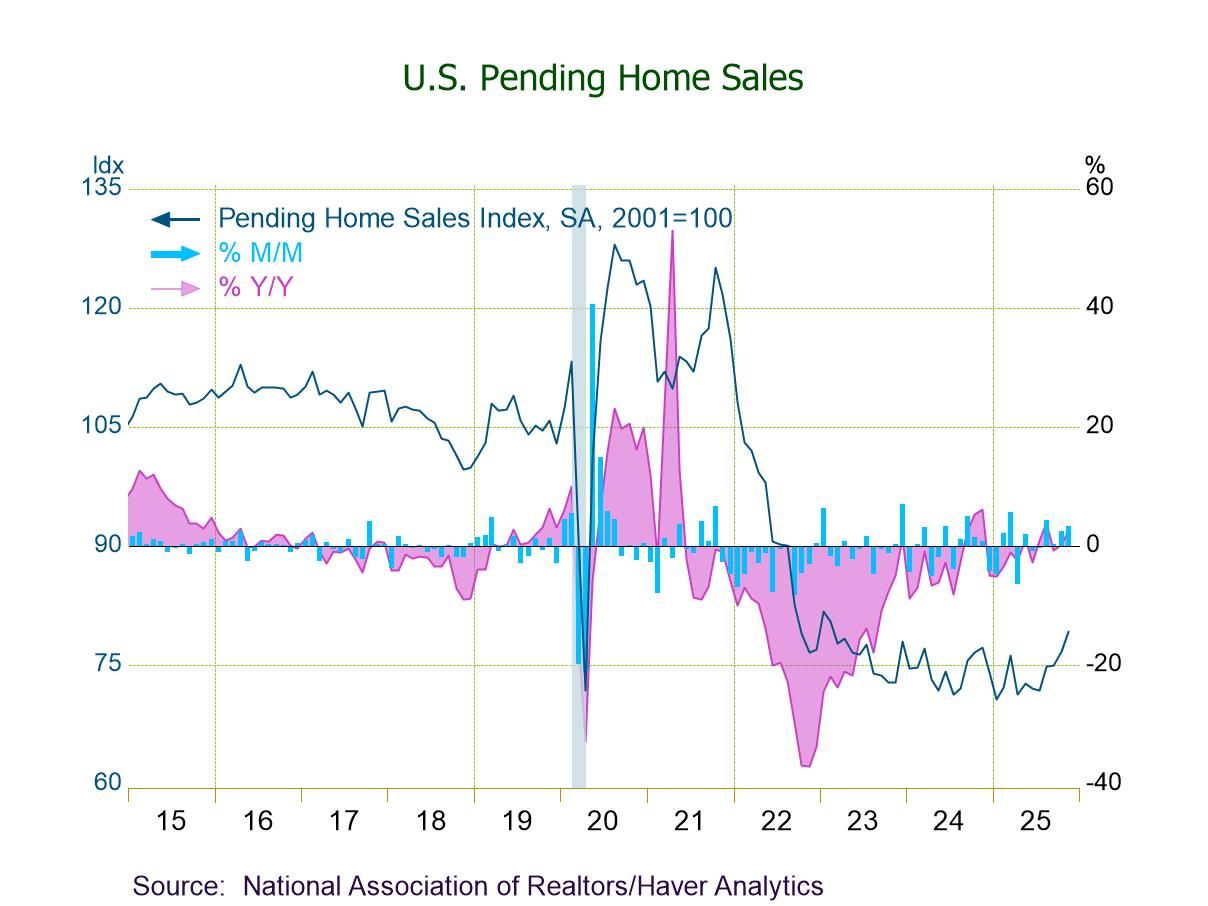 Global| Jan 07 2020
Global| Jan 07 2020U.S. Trade Deficit Narrows to Three-Year Low
by:Tom Moeller
|in:Economy in Brief
Summary
The U.S. trade deficit in goods and services declined to $43.09 billion during November from $46.94 billion in October, revised from $47.20 billion. It was the smallest deficit since October 2016. A $43.9 billion deficit had been [...]
The U.S. trade deficit in goods and services declined to $43.09 billion during November from $46.94 billion in October, revised from $47.20 billion. It was the smallest deficit since October 2016. A $43.9 billion deficit had been expected in the Action Economics Forecast Survey. Exports improved 0.7% (0.3% y/y) after a 0.1% dip while imports weakened 1.0% (-3.8% y/y) following two months of even sharper decline.
The trade deficit in goods fell to $63.00 billion in November after a sharp reduction in October's deficit to $66.70 billion. It also was the smallest deficit since October 2016.
Imports of goods declined 1.4% (-5.7% y/y) as nonpetroleum imports fell 1.2% (-4.8% y/y). Capital goods imports declined 2.0% (-3.7% y/y) and nonauto consumer goods were off 1.9% (-4.5% y/y). Industrial materials imports fell 1.5% (-12.1% y/y) and imports of foods, feeds & beverages weakened 1.3% (+0.1% y/y). Countering these declines was a 3.7% rise (-5.9% y/y) in automobile & parts imports. Petroleum imports declined 3.2% (-15.3% y/y) as the price of crude oil per barrel eased to $51.92 (-9.8% y/y).
Exports of goods rose 0.8% (-1.4% y/y), led by a 3.3% increase (8.8% y/y) in automobile & parts exports. Nonauto consumer goods exports increased 2.9% but were unchanged y/y. Foods, feeds and beverages exports rose 1.8% (6.4% y/y) while capital goods exports strengthened 1.4% (-5.8% y/y). Showing weakness last month, exports of industrial supplies & materials eased 0.4% (-2.1% y/y).
The surplus on trade in services was steady at $20.8 billion, but remained below the March 2018 peak of $22.8 billion. The value of services exports gained 0.5% (3.8% y/y). Tourism exports rose 0.3% (0.2% y/y). Charges for intellectual property exports improved 0.4% (3.4% y/y). Imports of services grew 0.8% (4.7% y/y). Tourism imports improved 1.2% (3.4% y/y) and intellectual property imports rose 0.5% (2.5% y/y).
The trade deficit with China narrowed to $25.6 billion (SA) billion in November from $36.2 billion twelve months earlier. Exports to China rose 18.8% (19.9% y/y). Imports fell 2.2% (-21.6% y/y). The trade deficit with the European Union lessened to $13.5 billion (SA), the least in nine months. Exports fell 1.6% (+3.8% y/y) while imports declined 3.1% (+0.6% y/y). The trade deficit with Japan increased to $5.7 billion (SA). Exports fell 9.2% (-13.9% y/y) while imports rose 6.4% (-7.8% y/y).
The international trade data, including relevant data on oil prices, can be found in Haver's USECON database. Detailed figures on international trade are available in the USINT database. The expectations figures are from the Action Economics Forecast Survey, which is carried in AS1REPNA.
| Foreign Trade in Goods & Services (Current $) | Nov | Oct | Sep | Nov Y/Y | 2018 | 2017 | 2016 |
|---|---|---|---|---|---|---|---|
| U.S. Trade Deficit ($ bil.) | 43.09 | 46.94 | 51.10 | 53.65 (11/18) |
627.68 | 550.12 | 502.98 |
| Exports of Goods & Services (% Chg) | 0.7 | -0.1 | -0.9 | 0.3 | 6.3 | 6.2 | -2.2 |
| Imports of Goods & Services (% Chg) | -1.0 | -1.7 | -1.6 | -3.8 | 7.8 | 6.8 | -1.7 |
| Petroleum (% Chg) | -3.2 | -0.0 | -4.6 | -15.3 | 20.8 | 27.2 | -19.4 |
| Nonpetroleum Goods (% Chg) | -1.2 | -2.4 | -1.9 | -4.8 | 7.5 | 5.5 | -1.3 |
Tom Moeller
AuthorMore in Author Profile »Prior to joining Haver Analytics in 2000, Mr. Moeller worked as the Economist at Chancellor Capital Management from 1985 to 1999. There, he developed comprehensive economic forecasts and interpreted economic data for equity and fixed income portfolio managers. Also at Chancellor, Mr. Moeller worked as an equity analyst and was responsible for researching and rating companies in the economically sensitive automobile and housing industries for investment in Chancellor’s equity portfolio. Prior to joining Chancellor, Mr. Moeller was an Economist at Citibank from 1979 to 1984. He also analyzed pricing behavior in the metals industry for the Council on Wage and Price Stability in Washington, D.C. In 1999, Mr. Moeller received the award for most accurate forecast from the Forecasters' Club of New York. From 1990 to 1992 he was President of the New York Association for Business Economists. Mr. Moeller earned an M.B.A. in Finance from Fordham University, where he graduated in 1987. He holds a Bachelor of Arts in Economics from George Washington University.


